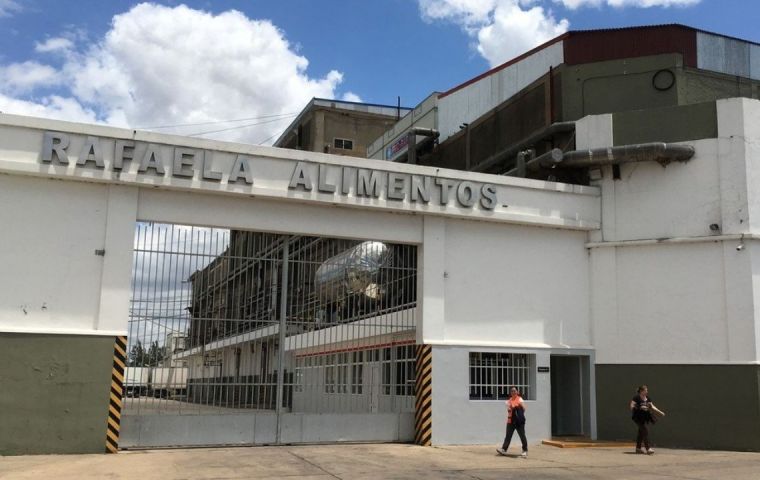MercoPress. South Atlantic News Agency
Argentine meat processing plant closes after ban on exports: agri-food producers go on strike
 “Inflation is not generated by agricultural producers,” said Pelegrina
“Inflation is not generated by agricultural producers,” said Pelegrina The Rafaela Alimentos meat processing plant in Casilda in the province of Santa Fe Tuesday closed down temporarily in response to the ban on exports decreed by the Argentine Government of President Alberto Fernández. The company employs 650 workers.
According to the company's website, its main export destinations were Aruba, Bosnia, Brazil, China, Ivory Coast, Hong Kong, Malaysia, Peru, Russia, Singapore, Switzerland, South Africa and the European Union.
Following the decision of the National Government to suspend beef exports for 30 days, the Rafaela Alimentos company announced the temporary closure of its refrigeration plant.
”We were all surprised,” said Meat Workers Labor Union leader Sixto Vallejos. “It was a measure is taken late yesterday (Monday) afternoon, when the Export Chamber was summoned to the Casa Rosada and it was briefed that they were closing exports for a period of 30 days,“ he added.
With no exports allowed, Wednesday will be the last day off of work for Rafaela Alimentos, which specializes in shipments of frozen meat abroad.
The company made a sizeable investment in 2019 to increase output capacity and generate more jobs at the refrigeration plant in Casilda, from where 75% of the production goes abroad and 25% to the domestic market.
Santa Fe Governor Omar Perotti criticized the national government and assured that ”the solution is to increase production and not close exports.“
Analysts on the optimistic side, insist the measure was taken for 30 days so that foreign demand does not bring up the domestic prices, thus adding to the country's worrying inflation. But Fernández had hinted the measure could be lifted earlier if the “positive results” were observed.
”We have the conditions to supply the internal and external markets, maintaining the possibility of exporting our products to the world,” Perotti wrote on Twitter.
Meanwhile, agrifood producers recall when then-president Néstor Kirchner implemented the same measure in 2006. It was to be for six months but it ended up lasting ten years.
Also Tuesday the Mesa de Enlace (Liaison Commission) grouping of rural producers warned that they were not going to be the “government's smokescreen“ and announced a full stoppage for nine days as of this coming Thursday.
The Liaison Commission accused the Government of using them as a ”smokescreen to cover up other problems,“ and denounced they tried to ”dialogue but we are not listened to,” LC head Daniel Pelegrina said in a virtual press conference.
Argentine Rural Confederations (CRA) President Jorge Chemes explained that trade of rural products will cease “until
Friday 28 inclusive.” He added that “I am deeply sorry to have to come to this. We do not like it, but we believe that the decisions made by the government are deeply wrong.”
He stressed that “instead of restricting exports, [the government] should encourage production so that in this way domestic consumption and also exports are properly supplied. But we have not been listened to and we have come to this instance.”
“We are going to incorporate different methodologies and other affected sectors,” said Chemes, who also warned Thursday's measures may be only the beginning in case their proposals are not heard. ”It is the beginning of a package of measures because if we do not have answers we will be adding other sectors of agricultural activities“, Chemes went on. “It is not a threat. It is a strategy to get answers. It is not just a manifestation of displeasure. It is what our representatives ask of us and we will adapt to the evolution of the events.”
”Our competitors, such as Brazil, are having a party with this measure,” the LC pointed out, particularly when in Shanghai, China, the main buyer, is holding the main import fair and Argentina will not be able to take advantage of it.
“Inflation is not generated by agricultural producers. It is elsewhere, in taxes, for example, and you also have to look at the fall in real wages,” Pelegrina said.




Top Comments
Disclaimer & comment rulesCommenting for this story is now closed.
If you have a Facebook account, become a fan and comment on our Facebook Page!